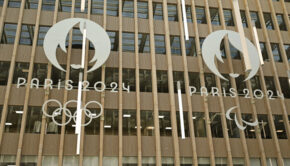Olympic chest pounding not permitted
Published on April 13th, 2020
There’s nothing subtle about the home page for the British Sailing Team website:
———–
We are the British Sailing Team
Welcome to the home of the British Sailing Team, the most successful national Olympic sailing team of all time. Our athletes compete in all ten Olympic classes, flying the flag for Great Britain at regattas all over the world.
British sailors have won 58 Olympic medals – including 28 golds – since sailing made its debut at the inaugural Olympic Games in 1896, plus many more accolades from top-level international competition.
Team GB currently tops the all-time Olympic sailing medal table – and our goal is to #RuleTheWaves at Tokyo 2020 and beyond.
———–
While the medal metric is up for debate, as the USA has earned more Olympic sailing medals (60) but fewer golds (19), the Brits have earned the right for chest pounding as the leading nation in four of the past five Games.
However, in this report by Philip Barker for InsidetheGames.com, we learn that Olympic chest pounding is not permitted:
The scoreboard at the Olympic Games is the medal count, and Statistical agency Gracenote has already predicted the United States will win 119 medals it at Tokyo 2020. This will put them top of a table which is expressly forbidden by the International Olympic Committee.
Rule 57 of the Olympic Charter includes the instruction that: “The IOC and the Olympic organizing committee shall not draw up a global ranking for any country.”
Although the Olympic oath requires an acceptance of the rules by everyone, this one Olympic regulation is disregarded on a regular basis by almost every National Olympic Committee and no one raises an eyebrow.
Gunilla Lindberg, general secretary of the Association of National Olympic Committees, has admitted: “It is very difficult to avoid because people are interested in how their countries are doing and comparing with other countries. It is a rule, but it always happens.”
It is a century-old problem. Before the First World War, United States Olympic official James Sullivan made a prediction for the 1916 Olympics.
“At Berlin, I am confident we will win as usual!” he said, after the 1914 IOC congress in Paris and elaborate scoring systems were devised to work out who “won” the Olympics.
Baron Pierre de Coubertin, IOC President in the formative years, would not have been amused.
“The true Olympic hero is, in my view, the individual adult male.”
To this day, “Rule 6 of the Charter states The Olympic Games are competitions between athletes in individual or team events and not between countries. They bring together the athletes selected by their respective NOCs, whose entries have been accepted by the IOC.”
After the Second World War, the respective NOCs included the Soviet Union, who took part for the first time in 1952. From then on, East and West drew up medal tables.
IOC President Avery Brundage was so concerned, he sent a letter to each NOC.
“The International Olympic Committee resents attempts to use the Games as a political instrument, or to pit one country against another,” he wrote. “We trust that you will do everything in your power to discourage the publication of scoring tables, which are quite worthless.
“It wishes to repeat it once more as follows: Scoring of Points. The Olympic Games are a contest between individuals. They are designed to be a joyous festival of the youth of the world. The competitors give their best efforts – win if they can – but, if not, rejoice with the victors.
“The Games are not, and must not become, a contest between nations, which would be entirely contrary to the spirit of the Olympic Movement and would surely lead to disaster. For this reason there is no official score of nations and tables of points are really misinformation because they are entirely inaccurate.”
He conceded: “Normal national pride is perfectly legitimate, but neither the Olympic Games, nor any other sport contest, can be said to indicate the superiority of one political system over another, or of one country over another.”
At the 1956 IOC Session in Cortina D’Ampezzo, Brundage raised the matter again.
“He doubts if the newspapers will give up publishing such classifying methods, but it is right that the general public should be informed that scoring by countries means nothing.”
Yet, a few weeks later, the New York Times reported that Soviet officials “boasted Russian top ranking in the Winter Olympics was what we came for”.
“We’re going to be way out in front at the Summer Olympics in Melbourne,” they said.
The IOC were further angered when the East German National Olympic Committee exhorted its athletes “not to forget the political question” whilst winning medals.
It prompted the British middle distance runner Chris Chataway to write: “The Olympic Games is no longer the field for gentlemen. It would be worth getting back all the same to the idea of an Olympic Games as a competition between individuals rather than a prestige battle amongst nations.”
IOC President Brundage was amongst those who advocated ceremonies with a fanfare of trumpets rather than national anthems, but nothing came of it.
Almost a decade later, the IOC met for their session in Mexico City ahead of the 1968 Olympics. and there were those prepared to try again.
“Prince George of Hanover then proceeded with his personal proposal to abolish the use of national anthems and flags during the victory ceremony of the Olympic Games.
“He stressed especially that the Olympic honors should be directed more to the athletes in their personal quality, than as a representative of their country.”
A total of 34 members voted for the change and only 22 against, but it was never adopted because a motion needed a two thirds majority to pass.*
Brundage had also raised the matter with NOCs and reported “in general they were against the idea”.
Many nations did compete under the Olympic flag at Moscow 1980, but this was in itself to make a political protest.
Sir Denis Follows, chairman of the British Olympic Association, admitted this was “a gesture to show our opposition to the Soviet invasion of Afghanistan”.
He also said that the decision was “to remove the nationalistic element which has become far too prominent in the Olympic Games”.
Despite this, the medal tables remained every bit as prominent in Moscow.
Unlike a league table in team sports, where points are awarded for a similar contest, the Olympic medal table does not compare like with like. Brundage himself drew attention to this anomaly in the 1950s.
“To be correct they would have to be weighted, since it is certainly unfair to give the winner of the marathon or decathlon, a winning gymnast, pistol shooter or yachtsman, and a winning football or basketball team the same score. Moreover, to be fair the factor of population should be considered, and if careful analysis were made, it would be discovered that many small nations have won far more Olympic medals on a per-capita basis than the larger countries.”
In 1976, Sports Review magazine also insisted that “the traditional medal table featured in the sporting press throughout the Olympic fortnight is quite meaningless as it fails to take account of a country’s population size”.
They suggested one showing “relative excellence” gold medals per million population, with relative strength wghowing the total medals per million population.
At the 2016 Rio Olympics, the United States won 46 golds, more than any other nation. Five of those went to Michael Phelps in his Olympic swansong.
Yet in a table based on population size drawn up by olympicmedalspercapita.com, the USA finished only 31st. The Bahamas were top, with one gold medal from a population of just 388,000.
Many of Fiji’s 892,000 citizens stopped to celebrate their first gold medal – success in sevens rugby in Rio. By all accounts, news of their victory stopped traffic in Suva and the players became national heroes. The memory of defeating New Zealand and Great Britain will live forever. Few will remember where Fiji finished in the “medal table”.









 We’ll keep your information safe.
We’ll keep your information safe.